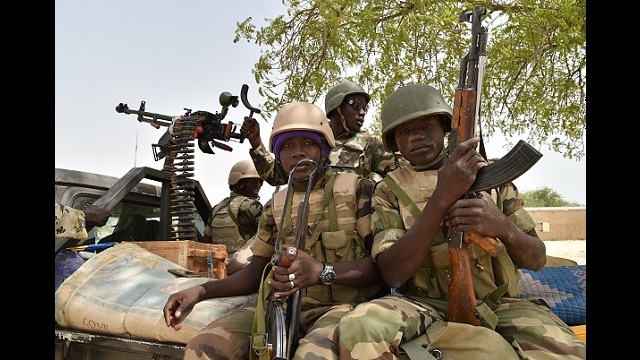
Niger’s army killed more than 280 Boko Haram militants near the southeast border with Nigeria in days of land and air raids, the defense ministry said according the defensepost.com.
More than 200 jihadists were killed in airstrikes and a further 87 by ground troops since the offensive began on December 28, the ministry said in a statement read on state television on Wednesday, January 2.
It comes after Western African leaders held talks in November on the escalating attacks by the Nigerian Islamist group in the Lake Chad area, a strategic region where the borders of Chad, Cameroon, Nigeria and Niger converge.
The operations were carried out on the islands of Lake Chad and along the Komadougou Yobe river which serves as a natural border between Niger and Nigeria, which has suffered a string of recent attacks on its military bases.
The Nigerien army said it had lost no troops or equipment in its offensive and had seized eight canoes and two rocket launchers as well as assault weapons, ammunition and vehicles.
In December, Niger’s defense minister said he feared Boko Haram would launch renewed attacks on its positions from January, when the Komadougou Yobe river’s waters which usually prevent incursions begin to recede.
Niamey was particularly concerned by the situation in Nigeria where “military bases have been defeated,” Defense Minister Kalla Moutari said in parliament.
“Boko Haram fighters were able to get supplies, they were able to reinvigorate themselves,” said Moutari.
Last week, fighters from the Islamic State West Africa Province faction of Boko Haram overran military bases near Baga on the shores of Lake Chad in Nigeria. Troops from the two bases – a Multinational Joint task Force post staffed by troops from Nigeria, Niger, Chad and Cameroon, and a naval base – withdrew to another naval base at Fish Dam on the shores of Lake Chad. That base was later attacked by ISWA fighters, prompting a Nigerian army offensive earlier this week.
Boko Haram’s bloody insurgency began in northeastern Nigeria in 2009 but has since spread into neighboring countries, prompting a regional military response. Some 27,000 people have been killed and two million others displaced, sparking a dire humanitarian crisis in the region.
Boko Haram split into two factions in mid-2016 over ideological differences. One is led by Abu Mus’ab Al-Barnawi and largely focuses on attacking military and government targets, while the other, led by Abubakar Shekau, is notorious for suicide bombings and indiscriminate killings of civilians.
Shekau pledged allegiance to Islamic State leader Abu Bakr Al-Baghdadi, but ISIS central gave its formal backing to the Barnawi faction, which is known as Islamic State West Africa Province.
ISWA has lately intensified its armed campaign, launching a number of major assaults on military targets in Borno and neighboring Yobe state in Nigeria amid signs of a takeover by more hardline leaders.
There have been dozens of attacks on military bases since July. Most of the attacks have been blamed on ISWA, or claimed by ISIS as ISWA attacks, but there has been an upsurge in attacks by both factions in recent weeks.
Militants have targeted both soldiers and civilians and have been blamed for abductions of children and employees of foreign companies.
In November, around a dozen girls were taken in raids on several border villages in southeastern Niger.
In the same month, seven local employees of the French drilling firm Foraco and a government official were killed after suspected Boko Haram gunmen stormed their compound. The camp was in Toumour in the remote Diffa region near the borders with Nigeria and Chad.
That attack shattered months of relative calm in the Diffa region near the Lake Chad basin.


